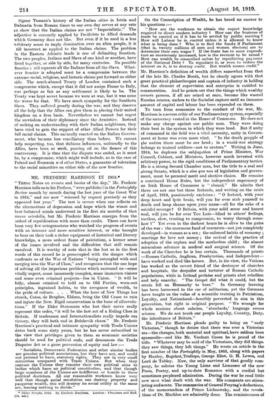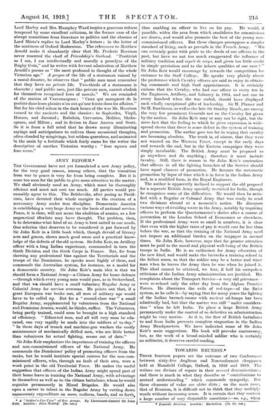MR. FREDERIC HARRISON IN 1918.• " THZ.SE Notes on events
and books of the day," Mr. Frederic Harrison tells us in his Preface, "were published in the Fortnightly Review month by month during the last year of the Great War in 1918," and are now " reissued by request precisely as they appeared last year." The test is severe when one reflects on the alternations of depression and hope which the wisest and best-balanced minds underwent. in the first six months of that annul mirabilis, but Mr. Frederic Harrison emerges from the ordeal of republication with more than credit. There can have been very few octogenarians who watched the progress of events with an intenser and more sensitive interest, or who brought to hear on their task a richer equipment of historical and literary knowledge, a more ardent flame of patriotism, a keener sense of the issues involved and the difficulties that still remain unsolved. It is worthy of note that in the last as in the first words of this record he is preoccupied with the danger which confronts us of the War of Nations " being entangled with and merging into the War of Class," and recognizes that the one hope of solving all the imperious problems which surround us—some vitally urgent, some immensely complex, some immature visions and some even criminal projects—lies in Union. " It will be folly, almost criminal to hold on to Old Parties, worn-out principles, ingrained habits, to the arrogance of wealth, to the pride of culture. . . . When the hour of New Things has struck, Catos, de Broglies, Eldons, bring the Old Cause to ruin and injure the New. Rigid conservatism is the bane of all revolu- tions." If the Elder Statesmen who lost their nerve really represent this order, "it will be the last act of a Ruling Class in Britain. If tradesmen and Internationalists really impede our victory, they will both end in Bolshevik chaos." Mr. Frederic Harrison's practical and intimate sympathy with Trade Unions dates back some sixty years, but he has never subscribed to the view that privileges given to them as economic societies should be used for political ends, and denounces the Trade Disputes Act as a gross perversion of equity and law :-
"Socialists, Democratic Federation and other similar bodies are genuine political associations, but they have not, and could not pretend to have, statutory rights. They are in very small minorities compared with Trade Unions. But when they capture the Unions they transfer their own political aims to bodies which have no political constitution, and that though large numbers of the Unions are indifferent or hostile to these political doctrines. All our reasonable workmen know very well that though social revolution oan destroy property and pauperise wealth, this will destroy its social utility in the same act, leaving nothing to divide."
• Obiter Seripla, 1918. By Frederic Harrison. London : Chapman and Hall. ps. net.]
On the Conscription of Wealth, he has heard no answer to his questions :-
" How are the workmen to obtain the expert knowledge required to direct modern industry ? How can the business of trade be carried on if it has to be settled by public meeting ? How will Labour be in control unless it is allowed to know what is being done ? Who is to find the funds if Parliament (that is, twenty millions of men and women electors) are to determine their own wages ? If the State has to meet expendi- ture so enormously increased, how is the revenue to be raised ? How can wealth be conscribed unless by repudiating payment of the National Debt ? To repudiate it, or even to reduce the interest on it, is to destroy credit. But wealth means credit."
Mr. Harrison's definition of wealth differs somewhat from that of the late Mr. Charles Booth, but he clearly agrees with that great practical philanthropist and captain of industry in holding that the element of supervision and enterprise is entitled to remuneration. And he points out that the things which wealthy owners possess, if all are seized at once, become like wasted Russian estates, useless to the Socialist captors until an immense amount of capital and labour has been expended on them.
To turn from eoonomics to the conduct of the war, Mr.
Harrison is a severe critic of our Parliamentary system, especially of the autocracy vested in the House of Commons. He does not
make any charge against our public men. They were doing their best in the system in which they were bred. But if unity of command in the field was a vital necessity, unity in Govern-
ment at home was even more vital. " In the death grapple of the nation there must be one head ; in a world-war strategy belongs to trained soldiers—not to orators." Writing in June, 1918, he deplores the subjugation of Prime Minister, War Council, Cabinet, and Ministers, however muoh invested with arbitrary power, to the rigid conditions of Parliamentary tactics. He is a strong Second Chamber man, but the title to a real and strong Senate, which is a sine qua non of legislation and govern- ment, must be personal merit and elective choice. He remains a convinced Home Ruler, but the independent supremacy of an Irish House of Commons is " absurd." He admits that there are not one but three Irelands, and writing on the crisis of April, 1918, passionately exclaims " 0 Ireland, with your deep heart and lyric brain, will you for ever stab yourself to death and heap shame upon your name—all for the sake of a suicidal revenge ? 0 Britain, with your solid sense and honest soul, will you be for ever Too Late—blind to others' feelings, tactless, slow, trusting to compromise, to worry through some- how ?" Yet even in the darkest hours he is alive to the gains of the war : the enormous fund of resources—not yet completely developed—in woman as a sex ; the enforced habits of economy ; marriage for love not money ; the revival of the practice of adoption of the orphan and the motherless child ; the almost
miraculous advance in medical and surgical science. Of the work of the Churches he is less certain. Thousands of priests —Roman Catholic, Anglican, Presbyterian, and Independent—
have worked and died like heroes. But, in his view, the Vatican has worked as the covert friend of the destroyer of churches and hospitals, the despoiler and torturer of Roman Catholic populations, while in Ireland prelates and priests abet rebellion and help anarchy. " The Gospel did what it could, but the strain fell on Humanity to bear." In Germany learning has been harnessed to the car of militarism, yet the Germans have taught us the value of a scientific training in Patriotism, Loyalty, and Nationhood—horribly perverted in aim in this generation, but right in original purpose. " We wrangle for whole sessions about salaries, ' standards,' language versus science. We do not teach our people Loyalty, Country, Duty, the inheritance of Britain."
Mr. Frederic Harrison pleads guilty to being an " early Victorian," though he denies that there was ever a Victorian era—the changes, both material and spiritual, have seldom been
spasmodic—and like Mr. Verdant Green he is proud of the title. "Whatever may be said of the Victorians, they did things, they saw things, they left things." He wrote an article in the first number of the Fortnightly in May, 1865, along with papers by Huxley, Bagehot, Trollope, George Eliot, G. H. Lewes, and Lord de Tabley. Now, the only survivor of that goodly com- pany, he salutes the Young Lions and Lionesses of the new Press, Poetry, and up-to-date Romance with a cordial but sometimes perplexed admiration. During the war he read little new save what dealt with the war. His comments are stimu- lating and acute. The summaries of General Freytag's deductions, of the memorandum of Prince Lichnowsky, and the revela- tions of Dr. Muehlon are admirably done. The reminiscences of Lord Morley and Mrs. Humphry Ward inspire a generous tribute tempered by some excellent criticism, in the former case of the abrupt transitions from literature to politics and the absence of Lord Idinto's replies to Lord Morley's letters ; in the latter of the mistiness of Oxford Modernism. The references to Matthew Arnold make it abundantly clear that Mr. Frederic Harrison never resented the chaff of Friendship's Garland. "Positivist as I am, I am intellectually and morally a proselyte of the Rugby Gate," and he writes with fervent admiration of Matthew Arnold's poems as " the most profound in thought of the whole Victorian age." A propos of the life of a statesman ruined by a moral disaster, he observes that " public men must remember that they have no private life. Two-thirds of a statesman is character ; and public men, just like private men, cannot abolish for themselves recognized laws of morals." We are reminded of the maxim of Vauvenargues : " Ceux qui manquent de la probite dans leurs plaisirs n'en ont qu'une feinte dans les aft sires." But for his chief solace in the dark hours of the war Mr. Harrison turned to the ancients and the classics : to Sophocles, Virgil, Horace, and Juvenal ; Rabelais, Cervantes, Moliere, Shake- speare, and Milton ; and in fiction to Jane Austen and Scott. So it is from a full mind that he draws many illuminating sayings and anticipations to enliven these occasional thoughts, often clouded by misgivings, but seldom querulous, and animated in the main by a fortitude which fairly earns for the writer the description of another Victorian worthy : " four square and four score."



































 Previous page
Previous page